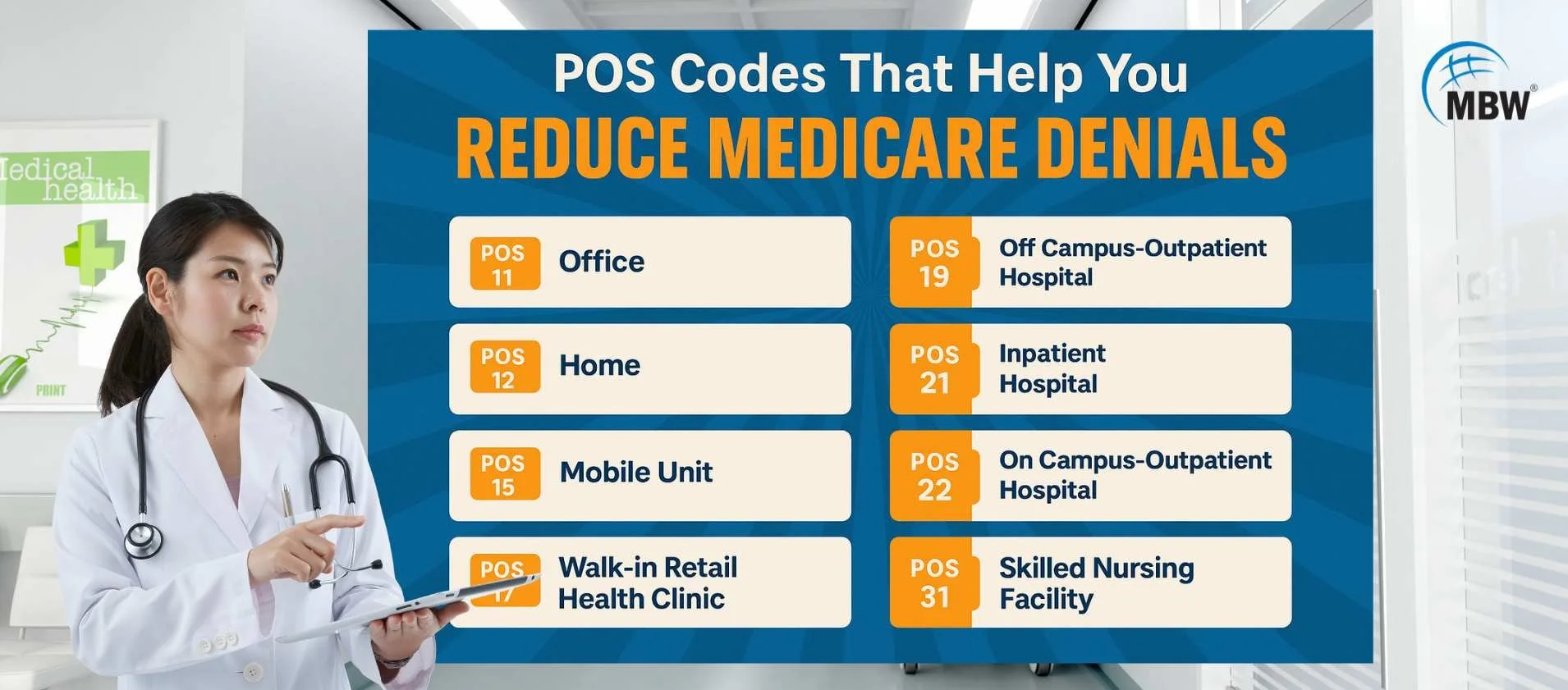Top 15 Billing Place of Service Codes to Reduce Medicare Denials
Billing Place of Service Codes are critical to successful Medicare billing. If the wrong code is submitted, even a well-documented claim can be denied. As a result, providers lose time, revenue, and trust in the system. This guide highlights the 15 most effective POS codes to reduce Medicare claim denials.
Here Are the 15 Billing Place of Service Codes to Reduce Medicare Denials
POS 11 – The Office Visit Code That’s Often Misused
Use POS 11 when services are delivered in a professional medical office. This code is frequently misused for virtual visits, which should instead use POS 02 or POS 10. Using POS 11 for telehealth will almost always result in a denial. Choose the correct Billing Place of Service Codes (POS) to avoid errors.
POS 12 – Home Services That Don’t Get Paid Without This Code
POS 12 is used when the patient receives services at their home. It must be used specifically for home-based clinical care, not long-term residential or custodial facilities. Submitting POS 11 or 33 in these cases can delay or deny payment. Reviewing Billing Place of Service Codes ensures you're using the right one.
POS 21 – Hospital Inpatient Claims Start Here
Only use POS 21 when a patient has been formally admitted to the hospital. Medicare requires the inpatient status to match both the POS code and the provider documentation. Outpatient services coded as inpatient lead to immediate denials. Billing Place of Service Codes help define this clearly. service or a deeper understanding of POS codes and their implications, refer to this guide on Place of Service Codes in Medical Coding.
POS 22 – The Commonly Confused Outpatient Hospital Code
POS 22 is for outpatient care received in a hospital facility. It is often confused with POS 11 (office), especially when providers operate in off-campus hospital clinics. Accurate selection of POS 22 prevents audit triggers and claim rejections.
POS 23 – Avoid Denials for ER Visits With This One
When a service is rendered in a hospital emergency room, POS 23 is the only correct code. Using POS 21 or 22 for ER visits can cause Medicare to question the urgency or classification of the service, resulting in delays or denials.
POS 24 – Surgical Center Billing Hinges on This POS
POS 24 must be used when a procedure is performed at an Ambulatory Surgical Center (ASC). Submitting ASC procedures under POS 11 or 22 is a leading reason for denied surgical claims under Medicare.
POS 31 – Skilled Nursing Facility Errors That Lead to Denials
For care provided in a Medicare-certified Skilled Nursing Facility (SNF), use POS 31. This is different from general nursing or long-term care. Billing SNF services under POS 32 causes claim denial and non-payment.
POS 32 – Nursing Facilities Are NOT SNFs: Use This Instead
POS 32 should be used for services in non-skilled nursing homes. Medicare distinguishes between these settings. Failing to identify this difference during billing leads to rejected claims and compliance flags.
POS 33 – Custodial Care POS Code That’s Frequently Skipped
Use POS 33 when providing custodial care in a residential setting. It applies to long-term support without medical oversight. Medicare will not accept SNF-level codes for these environments. Refer to Billing Place of Service Codes to select accurately.
POS 49 – The Independent Clinic Code Medicare Expects
POS 49 is for standalone clinics not affiliated with a hospital. Medicare denials often stem from using POS 11 or 22 for services performed in independent diagnostic or specialty centers.
POS 50 – FQHCs Must Use This Code to Bill Correctly
Federally Qualified Health Centers (FQHCs) must always use POS 50. Submitting these claims under POS 11 or 49 leads to rejected claims and disrupted funding.
POS 51 – Psychiatric Facility Codes That Medicare Watches Closely
POS 51 applies to inpatient psychiatric hospitals. Using POS 21 or POS 22 instead of 51 is a common billing error that affects reimbursement eligibility and may flag a review.
POS 65 – Dialysis Services Require This ESRD POS Code
Use POS 65 when services are provided at an End-Stage Renal Disease (ESRD) facility. Dialysis centers that default to POS 11 or POS 22 risk Medicare disallowance. Proper use of Billing Place of Service Codes ensures smoother approvals.
POS 62 – Rehab Facility Billing Errors Start With This
Comprehensive Outpatient Rehabilitation Facilities (CORFs) require POS 62. These are often misbilled under outpatient or office codes. This mistake not only results in denials but may cause revenue loss during audits. Double-check with current Billing Place of Service Codes.
POS 15 – Mobile Units Need This Code to Get Paid
For care delivered through mobile medical units (like vans or temporary setups), POS 15 is mandatory. Leaving it blank or defaulting to POS 11 causes Medicare to halt payment.
“I used POS 15 correctly once, and my mobile clinic claims stopped being ghosted by Medicare!”
How to Check if You’re Using the Correct POS Code Before Submitting a Claim
Before submitting a Medicare claim, it’s important to confirm that the Billing Place of Service Codes accurately reflects where the service was delivered—whether it was in an office, at the patient’s home, in a hospital, or via telehealth. Make sure the POS code aligns with what's documented in the patient’s chart and follows the latest CMS guidelines.
Using EHR alerts or a simple checklist can help catch mismatches early, since even one incorrect POS code can lead to claim denial or trigger an audit. For more detailed guidance on choosing the correct codes, refer to this guide to service codes for medical billing.
What Happens If You Leave the POS Field Blank on a Claim?
Leaving the Billing Place of Service Codes (POS) field blank on a Medicare claim is one of the most common yet costly billing errors. Medicare systems rely on the POS code to determine where the service took place, which directly affects payment decisions. When this field is left empty, the claim is typically denied without review or held up for manual processing.
Even if it slips through, it may be flagged later during audits for incomplete data. In short, a blank POS field signals an incomplete claim—and Medicare doesn’t pay incomplete claims.
How to Fix a Denied Claim Caused by the Wrong POS Code?
If your Medicare claim gets denied due to a wrong Billing Place of Service Codes, don’t panic—this is a common but fixable issue. The key is identifying the error quickly and submitting the corrected information with proper documentation. Here's how to do it:
Step 1: Review the Explanation of Benefits (EOB) to confirm the denial reason and code.
Step 2: Cross-check the submitted POS code with the provider’s original documentation to ensure the correct service location.
Step 3: Update the claim with the correct POS code based on CMS POS guidelines.
Step 4: Resubmit the corrected claim through your clearinghouse or EDI.
Step 5: If required, attach a corrected claim note or a brief explanation.
Step 6: If the payer doesn’t accept electronic corrections, submit a formal appeal with supporting documents.
Want help reviewing your POS codes or reducing denials?
Using the correct Billing Place of Service Codes is key to avoiding Medicare denials. Each code must match the actual service location—office, home, hospital, or telehealth. One wrong code can delay payment or lead to audits. Double-check your codes before submitting any claim. Medical Billing Wholesalers recommends implementing simple validation tools or checklists to ensure accuracy and reduce claim rejections.
Get a free quote and see how we can help reduce your Medicare denials.


